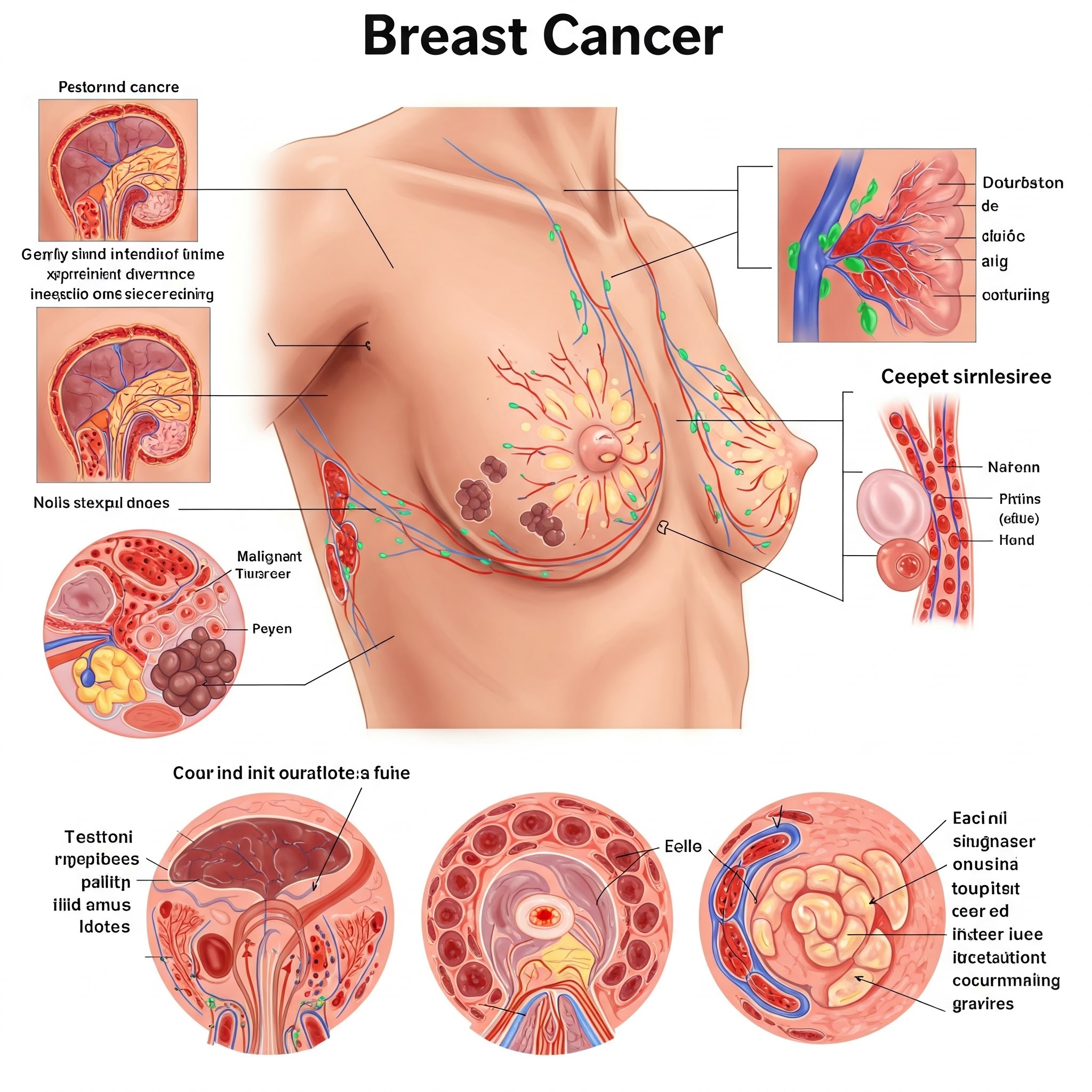Breast Cancer
Protect your health with early breast cancer detection
Expert guidance and comprehensive care for breast health
Understanding breast cancer causes is the first step in prevention. Our clinic provides advanced mammography screening using state-of-the-art technology to conduct a detailed x-ray of the breast, enabling early detection of abnormalities. If you’re searching for a ‘mammography test’ or ‘mammography near me,’ Neo-Woman’s Breast Cancer Clinic ensures convenient, reliable, and accurate diagnostic services.
We offer personalized care plans for different breast cancer types, addressing various breast cancer stages with targeted treatments. Our experienced oncologists create evidence-based breast cancer treatment plans tailored to each patient’s needs.


Neo-woman breast care clinic provides comprehensive breast health services:
Our team of dedicated specialists is here to support and guide women through every stage of their breast health journey. We offer expert consultations, advanced diagnostic services, and personalized care plans to address concerns related to breast health. From routine mammography screenings to detailed assessments of breast tissue, our clinic ensures early detection and timely intervention when needed.
We prioritize patient education and breast cancer awareness, helping women understand the early signs of breast cancer and the importance of regular screenings. If you have any questions or need assistance, please reach out to our caring team. Your well-being is our top priority, and taking proactive steps in breast care is essential for long-term health and peace of mind.
- Early detection and risk factors
Understanding the importance of mammography screenings and recognizing early signs can significantly improve breast cancer outcomes. Early detection through routine mammography tests allows for timely diagnosis and treatment, potentially saving lives. It’s essential to understand the risk factors, such as age, family history, genetics, hormonal influences, and lifestyle choices, that may increase susceptibility to breast cancer. By identifying these factors early, women can take proactive steps toward prevention.
Here are some of the check up and health screenings that you should get done:
- Pelvic Exam
- Pap Smear (Cervical Cancer Screening)
- Breast Exam
- Blood Pressure Measurement
- Cholesterol Screening
- Bone Density Scan (DXA)
- Blood Sugar Test (Glucose Screening)
- Thyroid Function Tests
- Blood Count (Complete Blood Count, CBC)
* The specific exams and screenings recommended can vary based on a woman’s age, family history, personal health history, and risk factors. It’s essential to discuss your individual healthcare needs and screening schedule with your healthcare provider.
- Types of breast cancer:
An Overview Breast cancer manifests in various forms, each with its own characteristics and treatment approaches. Ductal Carcinoma in Situ (DCIS) is considered an early, non-invasive stage of breast cancer. It involves abnormal cell growth confined within the milk ducts and has not yet invaded nearby tissues. In contrast, Invasive Ductal Carcinoma (IDC) is the most frequently diagnosed type of breast cancer, representing nearly 80% of all cases. IDC originates in the milk ducts but eventually spreads into the surrounding breast tissue, requiring more comprehensive treatment.
- Other common breast cancer subtypes
Another form, Invasive Lobular Carcinoma (ILC), begins in the lobules — the glands responsible for producing breast milk — and may extend into adjacent tissues or metastasize to other body parts. Triple-Negative Breast Cancer (TNBC) is distinguished by the lack of estrogen, progesterone, and HER2 receptors. It is typically more aggressive and less responsive to hormone or targeted therapies, making chemotherapy the primary treatment option. These distinctions are crucial, as they influence the treatment plan and prognosis for patients
- Hormonal and her2-related breast cancers
Hormone receptor-positive breast cancer is defined by the presence of estrogen or progesterone receptors on cancer cells. These types often respond well to hormone-blocking medications, such as tamoxifen or aromatase inhibitors, which aim to slow or halt the cancer’s progression. On the other hand, HER2-positive breast cancer involves the overproduction of the HER2 protein, which accelerates cancer cell growth. Targeted therapies that focus on blocking HER2 activity, sometimes combined with chemotherapy or hormone therapy, are effective in managing this type.
- Surgical approaches to treating breast cancer
Surgical intervention plays a vital role in breast cancer management. A lumpectomy, also called breast-conserving surgery, involves removing the tumor along with a small margin of healthy tissue. It is generally suitable for early-stage cases and is often followed by radiation therapy. For more extensive cases, a mastectomy — the removal of the entire breast — may be necessary. Mastectomies can vary: a simple mastectomy removes the whole breast, while skin-sparing and nipple-sparing mastectomies preserve more of the breast’s outer appearance.
- Lymph node procedures and reconstructive options
To evaluate whether cancer has spread, a sentinel lymph node biopsy is commonly performed. This involves removing the first lymph nodes that drain from the tumor area to assess potential spread. If cancer is found in these nodes or if the risk is high, an axillary lymph node dissection may follow to remove more lymph nodes from the underarm region. Additionally, many women consider reconstructive surgery post-mastectomy. This procedure, which can be done immediately or at a later date, uses either implants or the patient’s own tissue to restore the breast’s shape and appearance.

Frequently asked questions
What are the early signs of breast cancer?
Early signs include lumps in the breast, changes in breast size or shape, skin dimpling, and unusual discharge. Regular screenings help detect these signs early.
How often should I get a mammography screening?
It is recommended to get an annual mammography screening starting at age 40 or earlier if you have a family history of breast cancer.
What types of mammography tests are available?
We offer digital, 3D, and diagnostic mammograms to provide detailed imaging for accurate detection.
What are the main risk factors for breast cancer?
Risk factors include age, family history, hormonal factors, obesity, and lifestyle habits. Our specialists provide personalized risk assessments.
What treatment options are available at Neo-Woman Breast Care Clinic?
We offer comprehensive care, including surgery, chemotherapy, radiation, and personalized treatment plans tailored to individual needs.
Disclaimer: Results and patient experiences may vary. These are dependent on a number of factors including age, medical history, lifestyle and more.

Service line
Our locations
Neo-woman clinic
Apte Road
1212, Apte Rd, opp. Centro Hotel, Shirole Road, Shivajinagar, Pune, Maharashtra 411004
Contact us at: 9423039292
Our locations
Neo-woman clinic
Hadapsar
Gandharva Empire, 3rd floor, Above Fab India, Raskar Chowk, Amanora Park, Hadapsar, Pune, Maharashtra 411036
Contact us at: 7030114488
Copyright © 2026 neo-Woman – all rights reserved.
:::| powered by dimakh consultants |:::